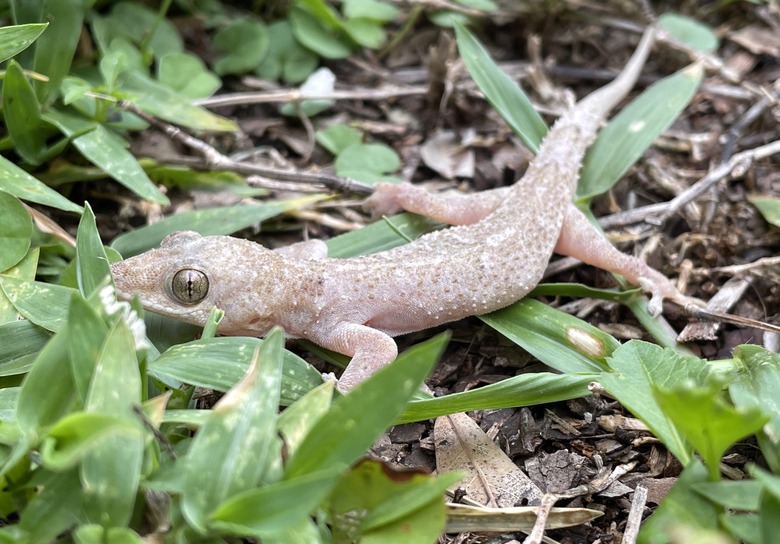How To Get Rid Of Geckos Outside Your Home
If you have geckos (Hemidactylus spp.) hanging out in your lawn or garden, think twice before driving them away. Geckos eat insects, so their presence might spare you from bigger pests like mosquitoes, wasps and ants. If these little lizards disgust you and simply must go, you can repel them naturally by limiting their food supply and removing hiding places. It's best to avoid pesticides and poisons because they rarely affect the geckos directly and may inadvertently harm pets, honeybees and other beneficial species. Glue traps are also potentially dangerous and inhumane.
Go Dark
Go Dark
Outdoor lighting attracts insects, and insects attract geckos. If you want to discourage geckos from visiting you, keep your outside lights turned off as much as possible. When you do need outdoor lighting, use a light source that is less attractive to insects than a standard incandescent bulb. Instead, use LED lights with a yellow or orange hue. There are special light bulbs on the market that claim to attract fewer bugs, but yellow and orange LED lights outperformed them in a 2016 study presented at the American Association for the Advancement of Science.
Dry Out
Dry Out
Standing puddles in the lawn and garden are an open invitation to geckos. When they're fresh, small pools of water provide the lizards with a source of drinking water. When the water stagnates, it becomes a breeding ground for the geckos themselves and mosquitoes, which geckos love to eat. Always put away gardening tools, children's toys and outdoor pet dishes when they're not in use so they don't hold water. If a portion of your lawn turns waterlogged and swampy when it rains, hire a contractor or do what you must to fix the drainage issue.
Tend to the Landscape
Tend to the Landscape
While examining your lawn for possible water sources, look for landscape elements that provide geckos with convenient living and hiding spaces. Make sure the mulch in your garden is no more than 3 inches thick and keep your grass mowed. Stack firewood at the farthest edge of your property and keep toys, fertilizer bags, planters and other items indoors or in a closed shed. The same items that can collect water may also provide cover. The more hiding places you provide, the more geckos you will have.
Walk on Eggshells
Walk on Eggshells
There's little scientific evidence to back up the claim that popular gecko deterrents work. Some users swear by them, however, and it doesn't hurt to try them. One popular theory is that dropping broken eggshells on your lawn will deter geckos. The thinking goes that if you break an egg in half, geckos will see it, believe that there's a predator nearby and vacate the area. If you test this remedy, replace your eggshells every three or four days. Planting garlic throughout your flower beds is another anecdotal solution for repelling geckos.
Get a Cat
Get a Cat
While proponents of the eggshell deterrent method say that this method makes geckos think a predator is lurking nearby, other people simply make sure there truly is a predator. Geckos aren't fond of cats, so adopting an outdoor kitty encourages geckos to go elsewhere. Unfortunately, cats do sometimes catch and kill geckos, so pet adoption has the potential to be somewhat inhumane. If this disturbs you, think twice about using a feline for gecko control. Another important consideration is that allowing a cat to roam free outdoors may violate local ordinances as well as expose your kitty to outside dangers such as predators and street traffic.
